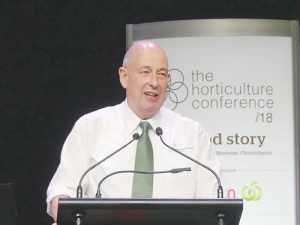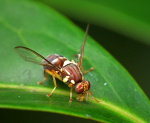Coming changes in labour relations law represent “a real crisis point” for all New Zealand businesses, says Horticulture NZ chief executive Mike Chapman.
It is one of the tough issues facing the industry, Chapman said in an address to the 2018 Horticulture Conference, recently held in Christchurch.
Chapman told delegates that when Labour stood for the election it said it would raise the minimum wage to $20/hour by 2020.
“That means another $1.75 each year for the next two years to make $20 by 2020 for the minimum wage. That will put inflation up in this country by 2% because it it ripples through everyone,” he said.
“We will be advocating to Government that they don’t do it, because that is so counterproductive to growth and the continued prosperity of this country.”
Chapman referred to a couple of bills coming through Parliament which Horticulture NZ, Federated Farmers, Business NZ and others had submitted on.
“On each of these points we engaged the select committee, particularly the Labour and Green members.”
The first was the plan to remove the 90-day trial period for new hires for employers with 20 or more employees. HortNZ submitted that the trial should be retained for businesses with 100 or fewer employees.
The 90-day trial had worked well despite the Government not accepting it had, he said. “Go to the Business NZ website and see the stats.”
Another proposal was to allow union reps to access any place of employment without permission, against which there were “obvious objections” on health and safety grounds.
There were also changes coming to collective agreement laws.
“The bill will compel collective bargaining and even if you’re not part of that collective bargaining, arguably your business will be bound by a deal you haven’t even made,” said Chapman.
“There are so many strikes on at the moment in the public sector. We’re going to see enormous inflationary pressures from these wage increases the public sector is getting, and then you add to it the pledge to increase the minimum wage to $20 by 2020.”
Chapman said the change of Government has brought a completely new focus. There have been casualties, including roading.
He noted that the Cambridge Expressway was recently completed, and those workers had been destined to build the upgrade from Tauranga to Katikati, but that has now been scrapped.
“So we’ve had workers who were skilled and reliable who built that fantastic expressway, and they’ve now gone to Australia.”
Similar things are happening in the gas and oil exploration industry, he said. Young workers are heading to Australia in numbers last seen 20 years ago.
“If we don’t stop that happening we won’t be able to call on those people who have reliability, skill and initiative.”
Chapman referred to some positive initiatives, such as boosting diplomats and foreign affairs to help push trade. The Provincial Growth Fund represents an enormous opportunity for the sector, he said.
However, costs are increasing in road tolls and regional fuel taxes and these will spread beyond Auckland.
Capital gains and environmental taxes are being considered, and “most importantly” for horticulture, immigration is tightening up.
Chapman said he was pointing out the problems “not to be depressing” but to highlight challenges that will make it harder to be in business and find people to employ.
A 2016 NZIER report identified a coming deficit of 6000 workers but the sector will need more than that, said Chapman. “We’re going to have to get out there and find them, source them and put them into work.”
Initiatives underway include a labour steering group focussed on the Recognised Seasonal Employer (RSE) scheme and on getting Kiwis working, the horticultural capabilities group, and employment practice workshops.
Meanwhile, Chapman applauded the 100 new horticultural apprenticeships being made available through Primary ITO.



















